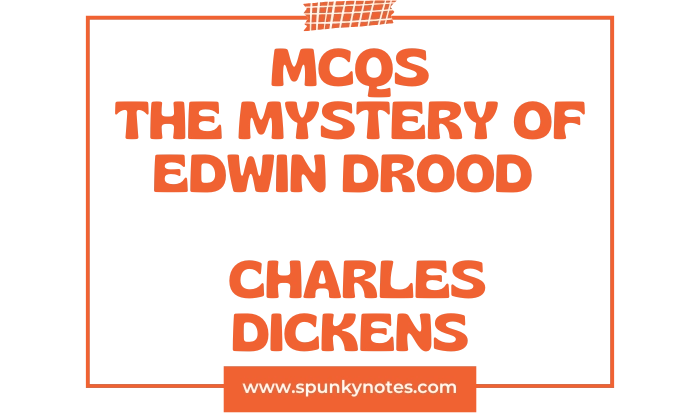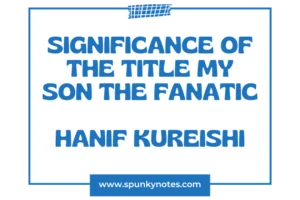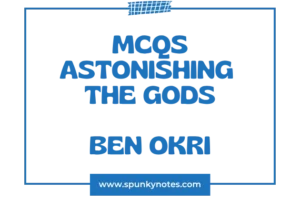

Estimated Reading Time: 16 min
The Mystery of Edwin Drood MCQs
1. Which novel is the last and unfinished work by Charles Dickens, published in 1870, the year of his death?
A. Bleak House
B. Hard Times
C. The Mystery of Edwin Drood
D. Our Mutual Friend
2. What intervenes between the eye and the Cathedral tower?
A. A spike of rusty iron
B. A flock of birds
C. A ship mast
D. A church spire
3. What did the Sultan go by to his palace in long procession?
A. White elephants
B. Dancing-girls
C. Ten thousand scimitars
D. Cymbals
4. What did the woman describe the current opium market price as?
A. Extremely low
B. Dreffle high
C. Moderate
D. Variable
5. What animal, described as infinite in number, followed the dancing-girls?
A. Horses
B. White elephants
C. Camels
D. Tigers
6. What did the man sit in, holding tight, to get the better of the “unclean spirit of imitation”?
A. A wooden chair
B. A lean arm-chair
C. His bed
D. The floor
7. Mr. Tope discreetly noted that Mr. Jasper’s breathing was so remarkably what?
A. Loud
B. Short
C. Fast
D. Deep
8. What two qualities crept over Mr. Jasper during his episode?
A. Anger and resentment
B. Dimness and giddiness
C. Strength and power
D. Sleep and confusion
9. What word did Mr. Tope shoot out as defying improvement?
A. Sick
B. DAZED
C. Confused
D. Fit
10. Mr. Crisparkle was lately “Coach” upon what type of high roads?
A. Legal
B. Pagan
C. Classical
D. Roman
11. To what position was Mr. Crisparkle promoted by a grateful patron?
A. Dean
B. Canon
C. Minor Canon
D. Verger
12. What physical item did Mr. Jasper tell Edwin to pull off?
A. His greatcoat
B. His boots
C. His gloves
D. His scarf
13. What adjective, paired with “exacting,” described Mr. Jasper’s affection?
A. Devoted
B. Hungry
C. Watchful
D. Vague
14. What two words were prohibited between Edwin and Jasper?
A. Brother and friend
B. Uncle and Nephew
C. Master and pupil
D. Eddy and Jack
15. What two items were placed on the table after the dinner cloth was drawn?
A. Wine and cheese
B. Walnuts and sherry
C. Port and biscuits
D. Tea and coffee
16. Edwin noted that Rosa could learn anything if she possessed what quality?
A. Will
B. Patience
C. Intelligence
D. Humility
17. What phrase did Edwin use to describe the marriage arrangement?
A. Anticipation
B. Good fortune
C. Curse
D. Necessity
18. What did Edwin complain of regarding the marriage arrangement?
A. It was too sudden
B. Being cut off from choice
C. The woman was ugly
D. The fathers’ interference
19. What did Mr. Jasper say was grinding him away by the grain?
A. The cramped monotony of his existence
B. His guilt
C. His love for Rosa
D. The terrible weather
20. What activity did Jasper say wretched monks would take up for relief?
A. Carving demons out of the stalls
B. Praying louder
C. Drinking wine
D. Sleeping
21. What did Jasper say he might have to take to carving out of his heart?
A. Angels
B. Demons
C. Names
D. Prayers
22. What sweet item did Rosa have in her mouth when greeting Edwin?
A. A lemon drop
B. An acidulated drop
C. A peppermint
D. A chocolate
23. Rosa wanted to go to the shop that sold what kind of sweetmeat?
A. Arabian
B. Turkish
C. Greek
D. Indian
24. Rosa noted her imaginary tall rival must be what, due to her height?
A. Beautiful
B. Gawky
C. Clever
D. Elegant
25. What did the organ and choir sound out sublimely as Edwin and Rosa spoke?
A. A discordance
B. A solemn swell
C. A trumpet fanfare
D. A battle hymn
26. What quality did Mr. Sapsea possess, besides being dull?
A. Portentous
B. Wealthy
C. Charitable
D. Wise
27. Mrs. Sapsea’s knowledge of the world never brought her acquainted with a Spirit more capable of doing what to him?
A. Loving him
B. Looking up to him
C. Following him
D. Guiding him
28. What final command was written on Mrs. Sapsea’s monument inscription?
A. Stop and pray
B. Live humbly
C. With a blush retire
D. Ask thy question
29. What was Durdles’s primary occupation?
A. Stonemason
B. Architect
C. Auctioneer
D. Verger
30. With which part of the Cathedral was Durdles better acquainted than any living authority?
A. The great tower
B. The chancel
C. The crypt
D. The choir loft
31. Durdles often spoke of himself in what person?
A. First
B. Second
C. Third
D. Fifth
32. Durdles claimed to have a touch of what specific affliction?
A. Rheumatism
B. The fever
C. The Tombatism
D. Gout
33. What did Mr. Jasper assent was a bitter cold place?
A. The crypt
B. The chancel
C. The Gate House
D. The Nuns’ House
34. What did Durdles request from Mr. Sapsea to begin the monument inscription?
A. The money
B. The key
C. The drawing
D. More wine
35. Mr. Crisparkle was doing what to assist his circulation in the morning?
A. Running by the river
B. Boxing at a looking-glass
C. Swimming in the weir
D. Lifting weights
36. What game did the Reverend Septimus wind up by getting his mother’s cap into?
A. A knot
B. A twist
C. Chancery
D. A drawer
37. What did Mr. Crisparkle rub his ear vexedly over regarding Philanthropists?
A. Generous
B. Miscreant
C. Charity
D. Humble
38. What violent action were Philanthropists “given to seizing their fellow-creatures by”?
A. The arm
B. The scruff of the neck
C. The hand
D. The throat
39. What did the passenger (Honeythunder) claim the driver was legally bound to provide for?
A. His master’s wealth
B. His fellow-man’s comfort
C. His own health
D. The horse’s safety
40. What was the driver’s response to the offer of brotherhood?
A. Thankee, my mother was contented with myself
B. I already have brothers
C. I accept your offer
D. I refuse your card
41. Neville and Helena were described as being of almost what type?
A. Nordic
B. Gípsy
C. Turkish
D. English
42. Neville and Helena Landless originated from where?
A. London
B. India
C. Ceylon
D. Africa
43. What violent emotion had Neville had to suppress since his earliest remembrance?
A. Deadly and bitter hatred
B. Fear of men
C. Love for Helena
D. Desire for wealth
44. What type of man did Mr. Grewgious remark he was, as he was unfit for social spheres?
A. Angular man
B. Unnatural man
C. Chip
D. Bachelor
45. What did Neville suddenly ask if Edwin Drood read with Mr. Crisparkle?
A. History
B. Latin
C. Nothing
D. Engineering
46. What caused the rush and clattering of glasses in Jasper’s room?
A. Edwin’s anger
B. Neville throws the goblet down
C. Jasper is rushing in
D. The wind
47. What did the cook say Neville ‘up’d’ with and threw at Edwin?
A. The chair
B. The table
C. Bottle, knife, fork, and decanter
D. His fist
48. What did Mr. Grewgious believe he was born as, instead of a bud?
A. A chip
B. A blockhead
C. A stone
D. A weed
49. What was the clerk’s name who had written a tragedy?
A. Edwin Drood
B. Mr. Crisparkle
C. Bazzard
D. Mr. Grewgious
50. Who did Rosa say had made love to her, causing her to flee?
A. Edwin Drood
B. Mr. Grewgious
C. Her uncle
D. His uncle (Mr. Jasper)
Brief Overview
The Mystery of Edwin Drood is the final novel by Charles Dickens. Sadly, Dickens died before he could finish the story. This leaves the central mystery of the book famously unsolved.
The story is set in the fictional cathedral town of Cloisterham. It focuses on a young man named Edwin Drood. Edwin is engaged to marry Rosa Bud, but their parents arranged their marriage, and they are not truly in love.
Edwin’s uncle is John Jasper, the cathedral choirmaster. Jasper seems respectable, but he lives a secret life as an opium addíct. He is also secretly and dangerously obsessed with Rosa Bud.
After Edwin and Rosa agree to end their engagement, Edwin disappears mysteriously. Suspicion immediately falls on Neville Landless, a newcomer who had argued with Edwin. Jasper, Edwin’s uncle, actively pushes the idea that Neville is the murderer.
The rest of the novel follows Jasper’s seeming hunt for the killer, though Jasper himself acts very suspiciously. A strange new detective named Datchery also appears in town to investigate.
Because Dickens died, readers never find out what really happened. No one knows if Edwin is truly dead, who the killer was, or what secrets Jasper was hiding.


